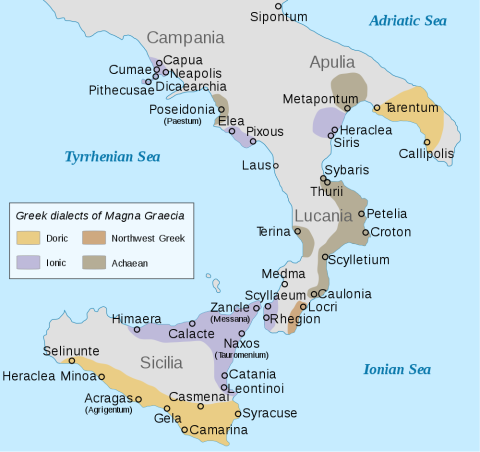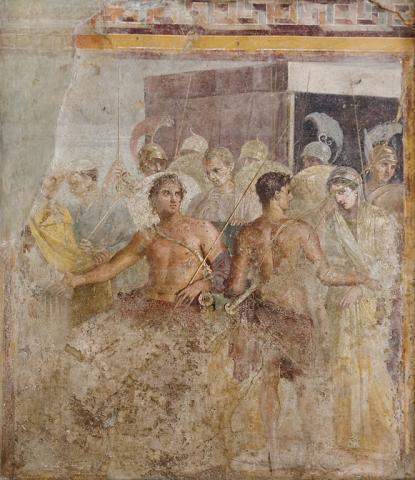[1.1.1] Χαρίτων Ἀφροδισιεύς, Ἀθηναγόρου τοῦ ῥήτορος ὑπογραφεύς, πάθος ἐρωτικὸν ἐν Συρακούσαις γενόμενον διηγήσομαι. Ἑρμοκράτης ὁ Συρακοσίων στρατηγός, οὗτος ὁ νικήσας Ἀθηναίους, εἶχε θυγατέρα Καλλιρόην τοὔνομα, θαυμαστόν τι χρῆμα παρθένου καὶ ἄγαλμα τῆς ὅλης Σικελίας. [1.1.2] ἦν γὰρ τὸ κάλλος οὐκ ἀνθρώπινον ἀλλὰ θεῖον, οὐδὲ Νηρηΐδος ἢ Νύμφης τῶν ὀρειῶν ἀλλ’ αὐτῆς Ἀφροδίτης. φήμη δὲ τοῦ παραδόξου θεάματος πανταχοῦ διέτρεχε καὶ μνηστῆρες κατέρρεον εἰς Συρακούσας, δυνάσται τε καὶ παῖδες τυράννων, οὐκ ἐκ Σικελίας μόνον, ἀλλὰ καὶ ἐξ Ἰταλίας καὶ ἠπείρου καὶ ἐθνῶν τῶν ἐν ἠπείρῳ. [1.1.3] ὁ δὲ Ἔρως ζεῦγος ἴδιον ἠθέλησε συλλέξαι. Χαιρέας γάρ τις ἦν μειράκιον εὔμορφον, πάντων ὑπερέχον, οἷον Ἀχιλλέα καὶ Νιρέα καὶ Ἱππόλυτον καὶ Ἀλκιβιάδην πλάσται καὶ γραφεῖς ἀποδεικνύουσι, πατρὸς Ἀρίστωνος τὰ δεύτερα ἐν Συρακούσαις μετὰ Ἑρμοκράτην φερομένου. καί τις ἦν ἐν αὐτοῖς πολιτικὸς φθόνος ὥστε θᾶττον ἂν πᾶσιν ἢ ἀλλήλοις ἐκήδευσαν. [1.1.4] φιλόνικος δέ ἐστιν ὁ Ἔρως καὶ χαίρει τοῖς παραδόξοις κατορθώμασιν· ἐζήτησε δὲ τοιόνδε τὸν καιρόν.
Notes
After a brief introduction of himself and his text, Chariton presents an almost fairy-tale like beginning, with a divinely lovely and ever-so-marriageable young woman, and an equally handsome young man.
1.1.1
Χαρίτων Ἀφροδισιεύς: “Chariton of Aphrodisias.” The nominatives agree (and stand in apposition with) the first-person subject of διηγήσομαι. Aphrodisias was the capital of the Roman province of Caria in western Asia Minor.
Ἀθηναγόρου τοῦ ῥήτορος ὑπογραφεύς: “Clerk of the orator Athenagorus.” For more on these titles, see the introductory essay.
πάθος ἐρωτικὸν: “Suffering at the hands of Eros,” i.e. “the experience of being in love”, a major theme of the novels and possibly a kind of name or nickname for the genre.
διηγήσομαι: “I will describe in full,” i.e. “I will narrate.”
Ἑρμοκράτης: Hermocrates of Syracuse was a leading player in Syracusan resistance to the Athenians’ Sicilian Expedition as described by Thucydides 4.58–65. Chariton uses Hermocrates to help establish both geographical and chronological setting.
τοὔνομα: “by name” or more literally “with respect to her name.” This is a krasis (=κρᾶσις, “blending”) of τὸ and ὄνομα. The phrase is an example of an accusative of respect or specifying accusative (G 537).
θαυμαστόν τι χρῆμα παρθένου: “a really marvelous example of a young woman.” χρῆμα can be used idiomatically to mean a striking example of something (LSJ, II.3), such as ὑὸς χρῆμα μέγιστον (“a very large example of a boar,” “a monster of a boar”). The indefinite τι strengthens the assertion (ML, II.5, S 1268).
ἄγαλμα: “glory” or “delight.” The people of Sicily see Callirhoe as their special treasure, but she is also like a “statue” of Aphrodite (LSJ ἄγαλμα A.3).
1.1.2
τὸ κάλλος: “her beauty.” The definite article, as often, indicates possession (G 551.d).
Νηρηΐδος ἢ Νύμφης τῶν ὀρειῶν: Nereids (nymphs of the Mediterranean) and other nymphs were typically imagined as sexually attractive young women, whose beauty might earn them the (sometimes unwanted) attention of a mortal or a god.
παραδόξου: “marvelous.” The Greek παράδοξος, > παρά + δόξα, literally “contrary to expectation,” was often associated with a popular genre of “incredible but true” stories and sights, including supernatural occurences and unusual natural phenomena.
κατέρρεον: “streamed”, “rushed down.” Imperfect > καταρρέω (LSJ, A.I.2). The flow of suitors to Sicily is metaphorically compared to a rushing river.
Σικελίας μόνον, ἀλλὰ καὶ ἐξ Ἰταλίας καὶ ἠπείρου καὶ ἐθνῶν τῶν ἐν ἠπείρῳ: suitors come from a broad area of Greater Greece (Magna Graecia), including Southern Italy. Syracuse lies in the southeast corner of Sicily, not far from Southern Italy. ἤπειρος, “the mainland,” refers either to “mainland Greece” in general or the region of northwestern Greece and Albania which is still known as Epirus. The Greeks in Epirus were closely connected to Sicily and Italy, as well as to the non-Greeks in the area (the “tribes”, ἔθνη, referred to here.)
1.1.3
ζεῦγος ἴδιον: “a unique pair.” a ζεῦγος describes “a couple” based on the metaphor of yoking pairs of working animals together. ἴδιος, “private” or “of his own” suggests that Eros’ actions are for his own (perhaps mysterious) purposes.
συλλέξαι: aor. act. infin. > συλλέγω (σύν + λέγω) “to gather together”
Χαιρέας γάρ τις ἦν μειράκιον εὔμορφον: “there was a certain Chaereas, a handsome young man.” The ἦν is existential. The noun μειράκιον refers to Chaereas and stands in apposition to him but is grammatically neuter. εὔμορφον and the subsequent participle ὑπερέχον agree with it in gender.
πάντων ὑπερέχον: “surpassing everyone else,” presumably in terms of attractiveness. The idea of comparison (signaled by ὑπερ-) takes a genitive of comparison (LSJ ὑπερέχω A.II.4.b).
οἷον Ἀχιλλέα … ἀποδεικνύουσι: “the sort of young man which sculptors and painters show … ” or more colloquially “like sculptors and painters show …” οἷος is a relative adjective pronoun which describes the sort of person and here serves as a predicate accusative (G 534). Achilles was the Greek hero most famous from the Iliad. Nireus is described in the the Iliad as “the most beautiful man of the Danaans who came below Troy, after the son of Peleus” (Iliad 2.673). Hippolytus, the ill-fated son of Theseus, was also conventionally handsome, as was the famous 5th century Athenian statesman, general, and playboy Alcibiades.
πατρὸς Ἀρίστωνος … φερομένου: δεύτερα is substantive, meaning “second place,” and stands as the object of φερομένου (LSJ δεύτερος III.A). The genitive absolute provides background information that contributes to Chaereas’ desirability, namely that his father Ariston held a place of prestige in Syracuse. While Ariston was a real name, Chariton is also playing on its meaning (“Best Man”) to evoke Chaereas’ father’s importance and aristocratic status.
τις ἦν … φθόνος: the indefinite adjective agrees with πολιτικὸς φθόνος (“political rivalry”). Competitive rivalries between prominent political men were a staple of ancient Greek governments. The specifics are not important for Chariton’s purposes or ours.
ὥστε θᾶττον … ἐκήδευσαν: “with the result that they would have made a marriage-alliance with anyone else sooner than each other.” Marriages between the children of prominent politicians were sometimes arranged to align their interest and minimize rivalries. The clause of actual result with ὥστε (G 639.a) includes a past potential construction with ἄν and the aorist indicative (G 467.c). On the combination, see S 2277.
1.1.4
φιλόνικος: “Fond of a challenge.” That is, Eros set his sights on this couple because the great challenge would make his victory (νίκη) sweet.
τοιόνδε τὸν καιρόν: “Some moment such as this:” As a member of the ὅδε, ἥδε, τόδε family of demonstratives, τοίονδε points forward to the description which will begin in the next sentence. It is indefinite because although this situation is the one that happened, any situation in which Callirhoe found herself in public might have done for Eros’ purposes.
Vocabulary
1.1.1
Χαρίτων -ονος, ὁ: Chariton (name)
Ἀφροδισιεύς, Ἀφροδισιέως, ὁ: From Aphrodisias, Aphrodisian
Άθηναγορας, -ου, ὁ: Athenagoras (name)
ῥήτωρ ῥήτορος ὁ: public speaker, orator
ὑπογραφεύς: one who writes under another's orders, a secretary, amanuensis
ἐρωτικός: amatory, related to ἔρως
Συράκουσαι: Syracuse
διηγέομαι διηγήσομαι διηγησάμην ––– διήγημαι διηγήθην: set out in detail, narrate
Ἑρμοκρατής, -ους, ὁ : Hermocrates (name)
Συρακόσιος: Syracusan
Ἀθηναῖος –α –ον: Athenian
Καλλιρὀη, -ης, ἡ: Callirhoe (name)
θαυμαστός –ή –όν: wondrous, admirable
παρθένος –ου ἡ: maiden, girl, virgin
ἄγαλμα –ατος τό: glory, statute, pleasing gift
Σικελία -ας ἡ: Sicily
1.1.2
κάλλος –ους τό: beauty pl. beautiful things
ἀνθρώπινος –η –ον: human, characteristic of people
Νηρηΐς –ίδος ἡ: daughter of Nereus, sea-nymph
νύμφη –ης ἡ: a nymph (an attractive, female nature-spirit)
ὄρειος [–α] –ον: of or belonging to the mountain
Ἀφροδίτη –ης ἡ: Aphrodite (name)
φήμη –ης ἡ: saying; report; voice; a prophetic voice
παράδοξος –ον: marvelous, unexpected, paradoxical
θέαμα –ατος τό: that which is seen, a sight, show, spectacle
πανταχοῦ : everywhere
διατρέχω διαδραμοῦμαι διέδραμον διαδεδράμηκα: to run across
μνηστήρ –ῆρος ὁ: suitor
καταρρέω καταρρυήσομαι κατέρρευσα κατερρύηκα: to flow down
δυνάστης –ου ὁ: a lord, master, ruler
τύραννος –ου ὁ: tyrant
Ἰταλία (Ion. -ιη) –ας ἡ: Italy
ἤπειρος –ου ἡ: the land (not the sea), the mainland of Western Greece, the mainland
1.1.3
Ἔρως –ωτος ὁ: Eros
ζεῦγος –ους τό: pair
συλλέγω συλλέξομαι συνέλεξα συνείλοχα συνείλεγμαι συνελέχθην (or συνελέγην): collect
Χαιρέας, Χαιρέου, ὁ: Chaereas (name)
μειράκιον: a boy, lad, stripling
εὔμορφος –ον: fair of form, comely, goodly
ὑπερέχω ὑπερσχήσω/ὑπερέξω ὑπερέσχον ὑπερέσχηκα ὑπερέσχημαι ὑπερεσχέθην: to excel, outdo
Ἀχιλλεύς –έως ὁ: Achilles, son of Peleus and Thetis, prince of the Myrmidons
Νιρεύς –έως ὁ: Nireus
Ἱππόλυτος: Hippolytus
Ἀλκιβιάδης: Alcibiades
πλάστης –ου ὁ: a sculptor, moulder, modeller
ἀποδείκνυμι ἀποδείξω ἀπέδειξα ἀποδέδειχα ἀποδέδειγμαι ἀπεδείχθην: point out, produce
Ἀρίστων –ωνος ὁ: Ariston
πολιτικός –ή –όν: of a citizen, civic, civil
φθόνος –ου ὁ: rivalry, envy, jealousy
θάσσων –ον: sooner swifter
κηδεύω κηδεύσω ἐκήδευσα κεκήδευκα κεκήδευμαι ἐκηδεύθην: to ally oneself in marriage
1.1.4
φιλόνεικος: fond of strife, eager for strife, contentious
κατόρθωμα: success


